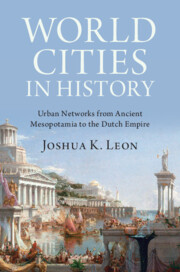Book contents
- World Cities in History
- World Cities in History
- Copyright page
- Dedication
- Contents
- Figures
- Acknowledgments
- 1 Introduction
- 2 Origins of Urbanization
- 3 Agora and Emporia
- 4 Alexandria, Alpha City
- 5 City Networks in the Roman Empire
- 6 Tale of Two Chang’ans
- 7 City-State Civilizations
- 8 Baghdad
- 9 Italian Communes and the Rise of Venice
- 10 Profit and Power
- 11 Urban Power in the Dutch Empire
- 12 Reflections
- References
- Index
8 - Baghdad
Crossroads of the Universe
Published online by Cambridge University Press: 12 December 2024
- World Cities in History
- World Cities in History
- Copyright page
- Dedication
- Contents
- Figures
- Acknowledgments
- 1 Introduction
- 2 Origins of Urbanization
- 3 Agora and Emporia
- 4 Alexandria, Alpha City
- 5 City Networks in the Roman Empire
- 6 Tale of Two Chang’ans
- 7 City-State Civilizations
- 8 Baghdad
- 9 Italian Communes and the Rise of Venice
- 10 Profit and Power
- 11 Urban Power in the Dutch Empire
- 12 Reflections
- References
- Index
Summary
The caliph Al Mansur literally forged the city plan in fire in 762 CE. His Round City was an architectural symbol of order in a vast combustible empire. Ninth-century Baghdad had relations extending from the Atlantic to China, with tranches of coins found as far afield as Scandinavia. The city was by design the heart of a vast city network at a time of pronounced urbanization, an urban golden age by standard reckonings. At the height of Abbasid power its population was an estimated 840,000. It thereby stretched the geographic boundaries of time and space across Eurasia, a Silk Roads terminus in its own right. Baghdad was one of the world’s preeminent “open cities,” incubating trade, knowledge in art, astronomy, mathematics, amidst a myriad of other cross-cultural exchanges. It attracted generations of scientists, philosophers, planners, and literati, especially from Central Asia. Migratory flows included a durable revolving network linking Baghdad to Merv and other key centers of learning and trade along the Silk Roads. Rapidly expanding Islamic civilization had to develop new forms of city building to spread Dar al Islam (the realm of Islam) across vast disparate realms.
- Type
- Chapter
- Information
- World Cities in HistoryUrban Networks from Ancient Mesopotamia to the Dutch Empire, pp. 180 - 202Publisher: Cambridge University PressPrint publication year: 2024

